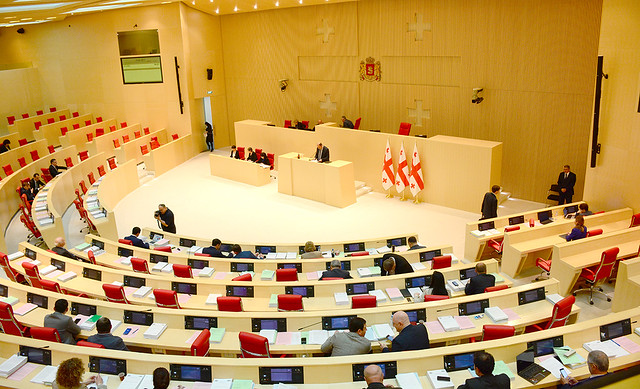MPs Listen to Public Defender’s Annual Report
The Public Defender of Georgia presented a report on the situation of human rights and freedoms in 2016 at the plenary session of the Parliament of Georgia on May 18, 2017. In his speech, Ucha Nanuashvili briefly reviewed all the directions and major challenges reflected in the parliamentary report. He also talked about the positive and negative trends in the protection of human rights, the legislation and gaps.
When talking about the successes and shortcomings in the performance of the obligations undertaken at the international level, the Public Defender referred to the absence of civic monitoring of the security system. In addition, he noted that significant recommendations of previous years had not been implemented or only partially implemented. The Public Defender reviewed several high-profile cases of 2016 and expressed his position concerning the Batumi developments and the details of the investigation of the so-called cyanide case.
The Public Defender spoke about the need for changes in the current criminal policy, problems in the penitentiary facilities, including the signs of prison subculture, the increased number of the use of non-custodial measures, the lack of rehabilitation-reconciliation programs for convicts and the violation of the principle of confidentiality at the meeting between prisoners and the Public Defender (or Public Defender's authorized representatives). He noted that the number of cases of ill-treatment by police officers increased in the reporting period, which required thorough and effective investigation. He once again emphasized the necessity of taking effective measures and establishing an independent effective mechanism for investigation of crimes committed by law enforcers, as well as a mechanism for checking the legality of the court decisions that entered into force in 2004-2012.
The Public Defender’s recommendations concern the change of the repressive drug policy, investigation of the illegal recording and dissemination of the videos showing private life, elimination of poverty, resolution of the problem of homelessness, needs of single parents and measures to be taken for the adaptation of the environment for persons with disabilities.
The Public Defender’s report reflects the situation of children living in socially vulnerable families and children's homes, as well as children living and working on the street, domestic violence, early marriage, increasing number of killings of women, gaps in the investigations of gender-based crimes, women's low involvement in political activities and hatred against the LGBT community.
Problems of refugees, asylum seekers, eco-migrants and repatriates, as well as the thousands of IDPs living under conditions dangerous for life and health and those without proper housing, have not been left beyond the attention of the Public Defender either.
When speaking about the issue of residents of the occupied territories, Ucha Nanuashvili negatively assessed the closure of the checkpoint on the division line. He noted that the establishment of an effective mechanism for monitoring the labour rights and safety, as well as determination of the amount of minimum wage at the legislative level and development of mechanisms for the protection of cultural heritage, has been an acute problem for many years and required an immediate response from the Parliament and the Government.
According to the Public Defender, we have significant challenges in terms of protection of freedom of religion and equality. The participation and involvement of national minorities in the decision making process is low. However, he praised the introduction of teaching of the Abkhazian language and the languages of ethnic minorities.
The Public Defender talked about the need for maintaining a healthy media environment and the problem of unjustified interference with the freedom of expression by the Government in relation to the court dispute over the Rustavi 2 TV company. The Public Defender considers it necessary to improve the legislative basis for ensuring freedom of information and performance of the obligation to issue public information. According to him, the criteria for appointment-promotion of judges raise legitimate questions.
“The report submitted today unites voices of hundreds and thousands of people, which should be heard, which expect support and assistance from us, since the reality today is full of killings of women, violence and hatred, violence that is punishable only by a fine of GEL 100. This is a reality, but my Georgian dream is to see Georgia, where no one has the feeling that their phones are illegally wiretapped, where IDPs do not feel like they are second-class human being, where minorities do not have the feeling that nobody will vote for them, where refugees and asylum-seekers are not afraid of extradition, where none of the prisoners has questions with regard to the investigation of his/her case of torture or ill-treatment, where independent investigative mechanism is established, where workers going to the Tkibuli mine are sure that they will return to their families, where persons with disabilities are not invisible, where the syndrome of impunity does not exist, where everyone trusts the court and where the Parliament takes into account the necessity of gender equality. This will be a challenge for each of us.
The report submitted today reminds us that we should all fight against violence, intolerance, persecution, discrimination and femicide. The report reminds us that humans are the highest value and it is our obligation to protect this value,” the Public Defender said at the end of his speech.
After the delivery of the report, the Public Defender answered the MPs’ questions.
At the session, Sophio Kiladze, Chairman of the Human Rights and Civil Integration Committee of the Parliament of Georgia, presented the draft resolution on the implementation of the Public Defender's report, which reflects only the part of the Public Defender’s recommendations. The Georgian Parliament has not adopted the resolution yet.
















